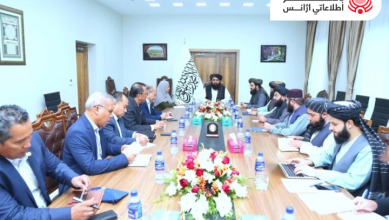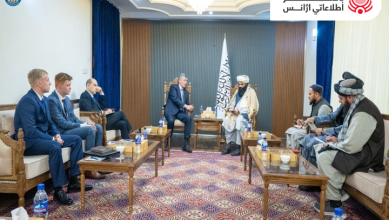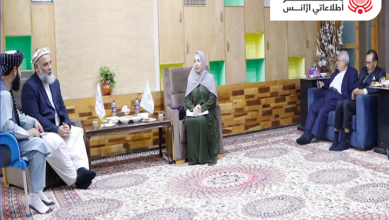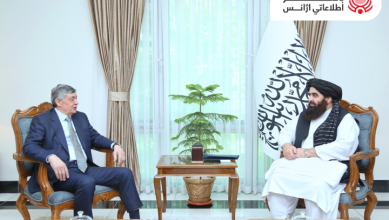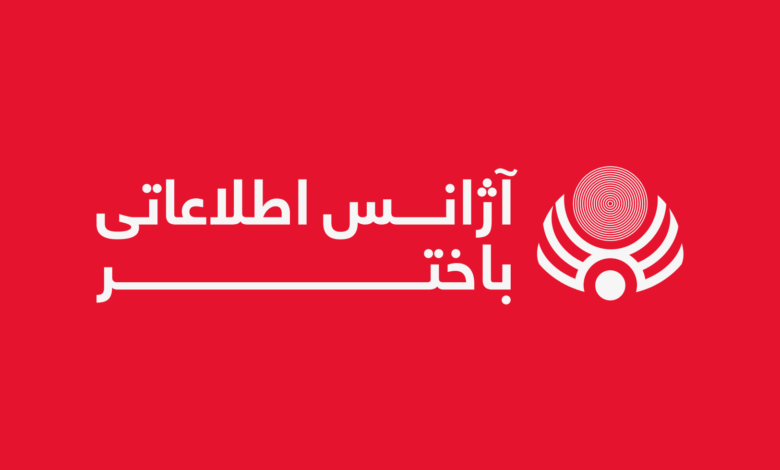
Sunday September 6, 2015
Kabul (BNA) Ministry of Foreign Affairs officially inaugurated the 6th Regional Economic Cooperation Conference on Afghanistan (RECCA-VI) on Thursday in Kabul with the participation of delegates from 30 countries and representatives from almost 40 organizations. The summit’s agenda focused on discussions around Afghanistan’s economic projects, transit and trade cooperation, customs systems, employing of Afghan workers in Gulf countries, connecting Afghanistan with regional countries and ways to find alternate transit routes. Opening the event and welcoming participants, Deputy Foreign Minister Hekmat Khalil Karzai touched on key policy themes of the conference—including inter-regional trade, synchronized customs and border routines, and market expansion — by emphasizing the need for enhanced regional economic and transportation cooperation.
“Afghanistan is ready and open for cooperation with all countries of the region at various levels and modes and in various fields like labor exchanges, energy, infrastructure, etcetera,” Karzai said. “Our engagement with our partners should not be perceived as opposing the interest of another partner.” Karzai emphasized that transit can be a good instrument for regional connectivity and connecting the region through railway and transit highways is among the priorities of the government of Afghanistan. According to Karzai, there are four new economic corridors in the region that are under consideration; the Chabahar Port through which India wants to connect to Afghanistan, Sink yang-Gwadar, Pakistan transit corridor, the Lapis Lazuli transit route through which Afghanistan wants to connect to Europe from Turkmenistan, Azerbaijan, Georgia, and Turkey route, and also the five-way railway transit corridor that connects China, Kyrgyzstan, Tajikistan, Afghanistan and Iran and the delegations of these countries are present in the RECCA-VI session.
Meanwhile, Minister of Economy, Mr. Abdul Sattar Murad stated that our economic future and that of our regional partners are dependent on the growth of transit, trade, mining, and reinforcement of the private sector role. Mr. Murad mentioned the Chabahar and Gwadar transit corridors as well as CASA-1000 project are the most important regional economic projects and added that necessary attention haven’t been paid aforesaid projects in the previous years. Mr. Murad stated that with the reduced international community assistance to Afghanistan, we need more economic assistance and cooperation from regional countries and one of the ways to assure sustainable stability in Afghanistan and the region, is the expansion of economic cooperation.
In the second day of the sixth Regional Economic Cooperation Conference on Afghanistan (RECCA-VI) inaugurated with remarks from President Ashraf Ghani and Foreign Minister Salahuddin Rabbani, stressing cooperation in areas of energy, natural resources and trade. Speaking at the conference in the Ministry of Foreign Affairs in Kabul, Afghanistan, President Ghani touched on the history of Afghanistan as a connecting bridge of South and Central Asia. He said that for millennia Afghanistan was a central node for world trade, where the Silk Road, one of the most important global trade routes with its complete system of transportation, passed through. Highlighting the legacy of entrepreneurial cultures that Afghanistan has inherited from the Silk Road, the President expressed hope that we see in the near future the end of war and emergence of an Asian continental economy where Afghanistan is once again the connecting hub.
In his speech, the President also underscored the need to understand the balance of constraints and opportunities as he looked forward to an inclusive and common future when Afghanistan’s geographical location is not seen as a curse but as a significant advantage. The President said that if peace and stability return to Afghanistan, our country will be one of the best destinations for tourists. Highlighting Afghanistan’s resources and potentials in different areas including water, energy, agriculture, horticulture, and mineral resources particularly rare earth materials, the President said that our country could become the largest producers of copper and iron as well as a significant player in the gold market. President Ghani stated that the National Unity Government has both the political will and a capable team to ensure progress and development in the country.
The President also underscored the importance of public-private partnerships and welcomed regional investment in the country. Concluding his speech, President Ghani said that networks of terror and violence bring a message of despair and exercise violence against innocent people and destroy our cultural heritage. He said that we need to have the courage to speak for the absolute majority of the Muslim world that rejects the message of hate, violence, and intolerance. Abdul Reza Rahman Fazli, Iran’s interior ministers, hoped RECCA-VI would be a source of blessing for Afghanistan and the region at large. He said Iran and Afghanistan had cultural, religious and historical bonds and Tehran had always stood by the Afghan government and people. “Iran’s policy has always been supporting peace and stability in Afghanistan. We consider Afghanistan’s stability synonymous with Iranian and regional stability,” he remarked. He said a stable, economically developed and self-reliant Afghanistan was in the interest of all regional countries.
“Rise in violence and extremism, the changing geography of war from the south to the north of Afghanistan and emergence of new radical groups have added to regional concerns,” the Iranian minister noted. “We have a firm belief that terrorists never differentiate between good and bad and we should come to the conclusion that these group are not only a threat to the region but to humanity as a whole,” he observed. Connecting Central Asia through Chabahar port in Iran was a dream for his country and the region, Fazli said, adding the long-cherished objective was all set to be translated into a reality. Sirojiddin Aslov, Tajikistan’s foreign minister, said in his remarks RECCA was a good opportunity for reviewing achievements of previous summits. Socio-economic development would be elusive without security in Afghanistan. He said technical and financial assistance should be delivered to Afghanistan to fight organized crime on its borders.
Aslov said less heed had been paid to the development of transport and energy sector in Afghanistan that was a huge impediment in the way of economic development. Special attention, he said, should also be paid to these sectors which were vital for economic growth. “We are sure impediments in the way of infrastructure development could be removed in properly planned ways. Tajikistan would support such programs in Afghanistan,” he promised. He said even after the complete withdrawal of international forces from Afghanistan, the country would still need international cooperation to move forward towards economic development. Tajikistan expressed support for Afghanistan’s peace process. Mohammad Quli Mohammaduv, finance minister of Turkmenistan, insisted on a political solution to the current problems in Afghanistan, suggesting Turkmenistan’s neutrality should be used for promoting peace process. Arjun Tappa, secretary general of the South Asian Association for Regional Cooperation (SAARC), believed Afghanistan could serve a bridge between Central and South Asia. The grouping has launched programs in this regard. Sujata Mehta, India’s representative, said: “The Afghan people could not wait for long and therefore our aim is also focused on executing economic projects. We should priorities our activities so that Afghanistan could benefit from them.” Chief Executive Abdullah Abdullah on Friday afternoon officially closed the 6th Regional Economic Cooperation Conference on Afghanistan (RECCA-VI).
In his closing remarks, Dr. Abdullah said that the past two days had been extremely busy for delegates and that “much territory has been covered and discussed, and we have together come to some important conclusions about the way forward”. “I take this opportunity to thank all regional partners and other stakeholders, and express my sincere appreciation for your input and valuable contributions,” he said. “I can say with confidence that RECCA has moved into a new era. This forum is now truly regional in its perspective, and pragmatic in its approach to economic cooperation and regional economic integration.” He said this demonstrates that we Afghanistan is positively impacted by the ongoing infrastructural revolution, the opening of new corridors and the creation of new opportunities and livelihoods for millions of its people. “As the RECCA process has highlighted, the selected projects are proposed strategically, in order to facilitate activity, energize the pathways and reduce the bottlenecks on these emerging trade and transit corridors,” he said.
Dr. Abdullah said that the key to this process in moving forward is the launch of the RECCA Implementation Phase. “We welcome stakeholders, partners and investors to work with us hand-in-hand during this critical phase.” In conclusion, he said: “As we deal with a diverse set of challenges, this conference has proven to us once again that the opportunities and potential for growth and prosperity at the regional level are real and attainable. The work has already started, and Afghanistan is ready to play its role in the larger context.” This is the 6th RECCA conference and the first since President Ghani assumed office a year ago pledging to end the war with the Taliban and reform the economy.

